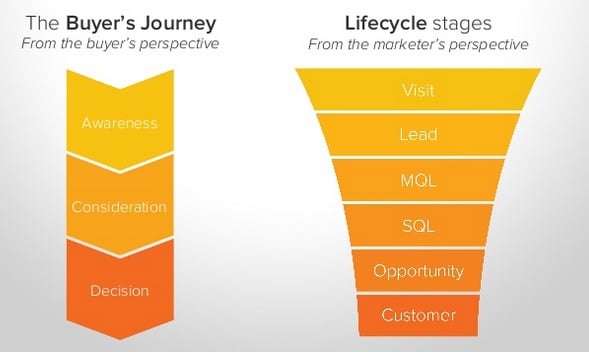
Ok. So we’ve discussed the best music marketing strategy for consistently engaging your customers while encouraging active growth: Inbound Marketing in a recent blog, and now we’re going to dig into one particular piece of that: lifecycle stages.
Didn't read part one? Here's the link!
First, let’s get the obvious question out of the way:
What are lifecycles?
Lifecycles are ways of defining where your customer or fan is on their buyer’s journey.
The idea behind lifecycle stages is to understand the questions your potential customer is asking at each step in the buyer's journey and then provide those answers at each stage.

As you can see, these two go hand in hand and your job as a marketer is to lead them through their buyer's decision journey. The most efficient way for you to execute this is by understanding lifecycle stages.
Time to flex some marketing muscles!
"Lifecycle stages allow you to give the right people the right content at the right time."
Let me explain that a bit more by showing you the lifecycles in the context of a musician attempting to reaching a fan.
We have:
Contact
Someone that is aware of your brand on a surface level. Maybe they saw you open at a show, heard your music on a playlist or radio station, or were told to listen to you via a friend.
The question: Who is this band? Do I like them?
Subscriber
This could be an email subscriber or someone that likes you on social media
The question: How do I get more in touch with this band?
Lead
This is someone that has expressed interest in a more tangible way. Perhaps they’ve opened a certain number of emails or reached out on social media.
The question: What does this band stand for? Do I agree with their message/branding?
Marketing Qualified Lead
This is someone that has been responding well to marketing initiatives and is considered an active fan.
The question: Alright, I’m listening. This band obvious has some talent. But are they worth my hard earned cash?
Sales Qualified Lead
This person has expressed enough interest to qualify for special sales initiatives. Perhaps you add these people as a segment in your mailing list and offer them a limited time album bundle etc..
The question: Ok, this band is worth my money… but I don’t quite know what I want. Vinyl? T-Shirt? Tickets? What are my options?
Opportunity
Say you offered the sales qualified lead above the bundle and they clicked through the email but didn’t purchase, this would be an opportunity. They are extremely close to a sale.
The question: I’ve decided I want to buy tickets to the world tour! What’s the easiest way to do this?
Customer
Boom. This person just bought concert tickets or an album and is now a proper customer. Now continue to delight them through email marketing and promotions to bring them to the next stage.
The question: Did I like what I purchased in the long-run? Will I buy from them again?
Brand Evangelist/Superfan
Now they're officially a fan. This person is spreading your brand to the masses and is proud to do it. When you need fans to lead marketing efforts, have a deal that’s limited in stock, or want to offer VIP perks, these are the people to give those to.
The question: How do I get more people to know about this band? What reward do I get for continuing to spread the word?
Keep in mind, you can use this for whatever business you run.
Do you provide tour support and production? What does a Sales Qualified Lead look like to you? How about a producer who sells tracks, beats, and loops? Who is a Lead for you? The key is to define your lifecycle stages for YOUR business.
How should you use this information?
Well, if you can properly define your fans or customers by stage based on explicity defined qualifications, what does that allow you to do? Lifecycle stages allow you to give the right people the right content at the right time.
This is the key. Let's take another practical musician or management firm to fan example:
Let's say you or your artist has a VIP club, and you're looking to expand the membership numbers. You could send out emails and physical mail invitations to everyone, but that is considerably more expensive.
If you can properly define your customers by stage, you can know exactly which fans aren't in the fan club but are customers and/or superfans. This is the ideal sales demographic, and your marketing efforts will be much more effective when targeting these specific individuals.
And how do you track this information?
There isn't any one way, but there are a lot of tools we've found useful:
Hubspot - The leader of Inbound marketing. This is the king of Inbound platforms.
LeadIn - Track how users interact on your site.
Facebook Audience Pixels - Gather information about your website visitors and optimize Facebook’s algorithms for effective ad campaigns.
Buffer, Hootsuite, or Followerwonk - Track your content on Social Networks. Use this along with LeadIn to see you best referral of vistors.
Mailchimp - Because it’s our favorite email marketing software. Utilize forms, surveys, and segments for the best results. Here's an email segmentation blog to get you started!
SumAll - High level fan trends.
Artist Growth - Artist Platform to help track revenue.
There you have it! Chat with us below if you have any thoughts or questions, and make sure you've read part one of the best new music marketing strategy series!
Ready for more? Check out Part 3 - How to Create Engaging Content


